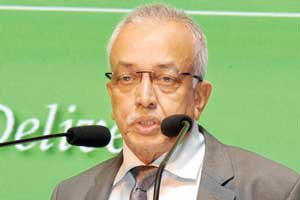Sunday Feb 15, 2026
Sunday Feb 15, 2026
Thursday, 4 August 2016 00:48 - - {{hitsCtrl.values.hits}}
By Uditha Jayasinghe
The Government is throwing open the doors to business by offloading non-strategic public enterprises, even those profitable, including hotels, a port and airport and commercial property either by listing them on the stock exchange or joint ventures with private companies, a top official said yesterday. 
As part of Prime Minister Ranil Wickremesinghe’s Five-Year Plan to be presented to the public in the next two months, the Government has planned sweeping reforms centred on private-public-partnerships to reduce debt and improve public revenue, Development Strategies and International Trade Minister Malik Samarawickrama said at the Sri Lanka Economic Summit 2016 organised by the Ceylon Chamber of Commerce.
“Over the next few months it is our intention to dispose of hotels, Lanka Hospitals and private commercial property in Colombo business districts via the stock exchange or through requests for proposals. Various options are also being considered for SriLankan Airlines on an urgent basis. We are also in the process of finalising PPP or joint venture arrangements of the Hambantota Port and Mattala Airport, thereby reducing the heavy debt burden. These transactions will be conducted in an open and transparent manner,” assured Samarawickrama.
The Minister was insistent on the need to reduce losses of State Owned Enterprises (SOEs), which he insisted was a massive drain on limited Government funds. He noted that Prime Minister Ranil Wickremesinghe in his forthcoming presentation of the Five Year Plan would set out strategies for SOE reform and disposal of non-strategic State assets including a Public Enterprise Board to make independent appointments.
“Let me emphasise that it is no longer viable for the Government to allow continued loss-making by the SOEs, the lack of fiscal space indentified by the debt burden simply does not allow for this. Through a combination of restructuring and the sale of non-strategic private assets, the Government is determined to effectively address this long standing problem, which has been a major drag on the development of the country.”
The Minister was emphatic over the need for a strong PPP framework, which clearly lays out policy, legal and institutional obligations for contracting PPPS, which in his view would go a long way to create the enabling environment to attract PPP. The Government is working with the Asian Development Bank (ADB) and the World Bank to create such a framework.
“The balance sheets of some SOEs such as the Ceylon Electricity Board (CEB) and Ceylon Petroleum Corporation (CPC) have been undermined by what are effectively Government subsidies. These subsidies need to be rationalised and limited by the Government Budget. Traditions of shifting parts of the Government Budget deficit to the balance sheets of SOEs and State Banks should be disconnected. The financial health of these enterprises can also be improved by addressing funds that are owned to them from other Government agencies.”
Reducing losses of SOEs would give space for State Banks to reduce the red in their balance sheets and free up resources for investment and entrepreneurship that would eventually lead to stronger, sustained growth, the Minister said.
“The balance sheets of two State banks from losses incurred by SOEs would facilitate the reduction of interest rates and boost investment and enhance the profitability of these enterprises. It would also lead to a lower interest rate regime. The disposal of non-strategic State assets would have a positive fiscal impact at a time when Government finances are being constrained by lower and commercial SOEs listing on the stock exchange will increase disclosure thereby leading to the improvement of operational efficiency.”